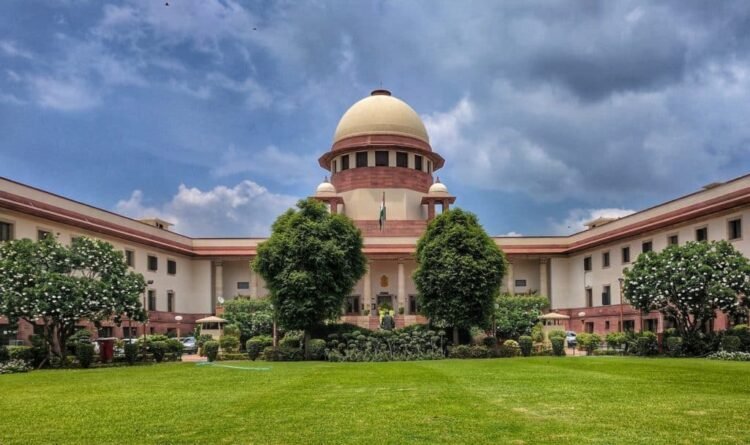Please argue that amendments severely restricted use of foreign funds by NGOs for their activities and transfer to other philanthropic organisations
The Supreme Court on Tuesday asked the government why the Ministry of Home Affairs (MHA) has been tasked to keep an eye on the inflow and subsequent outflow of foreign funds to NGOs under the foreign contributions regulations law.
“Why has the whole operation been brought under the Ministry of Home Affairs and not under the finance department?”, Justice A.M. Khanwilkar, heading a three-judge Bench, asked Solicitor General Tushar Mehta.
The question was posed during the hearing of petitions challenging the amendments to the Foreign Contributions Regulations law in 2020.
The petitions argued that the amendments severely restricted the use of foreign funds by NGOs for their activities and transfer to other philanthropic organisations within the country.
Intelligence Bureau (IB)
Mr. Mehta said Intelligence Bureau (IB) inputs have shown that foreign funds entering India were used to fund activities that destabilise national peace and security. The inputs even indicated that the money was used to train naxals.
Also Read: India’s Supreme Court says No foreign funds for NGOs if purpose not declared
Money has come to fund naxal activities: Tushar Mehta
“There is an element of national security, integrity of the nation involved here. Why should someone sitting in some foreign country pay… Every transaction is watched by the MHA, from the very beginning… Money has come to fund naxal activities,” Mr. Mehta responded to the court’s query.
Mr. Mehta said the people at the helm of these organisations should be known, and the MHA was best placed to do that. Identification of the recipients of foreign funds were known via the Aadhaar system – a precaution introduced by the statute itself. The amendments were introduced to prevent NGOs from acting as “middlemen” between foreign contributors and local, unregistered NGOs.
“You cannot become a commission agent for just receiving and distributing foreign funds after retaining 20% of the funds for ‘administrative’ expenses. If you are so influential that you can successfully encourage people abroad to send money, then you can advise them that ‘here are 10 NGOs who are doing good work and you can send money to them directly’… You cannot act as a middleman,” Mr. Mehta argued.
‘Can’t be termed commercial’
Senior advocate Gopal Sankaranarayanan, for the petitioners, said the act of an NGO to apportion the funds received from abroad to organisations working on the ground cannot be termed “commercial”.
The law mandated that NGOs use foreign funds they received for the registered purposes or activities – social, educational, religious, cultural and economic – of their existence.
Mr. Mehta said the amendments have been introduced to “strengthen the mechanism, enhance transparency and accountability”. It was noticed before the amendments came only a miniscule portion of the foreign funds were actually used by NGOs for their registered objectives. The amendments helped the government keep watch and ensure that NGOs were getting and spending foreign contributions for the “definite programmes” spelt out in their articles of association.
19,000 NGOs violating the law
“Once you [NGOs] get hundreds of crores of rupees as foreign funds, it has to be known that the money is being used for these purposes alone,” Mr. Mehta submitted.
He said the registration of 19,000 NGOs had been cancelled for violating the law.
The amendments mandated that registered NGOs open a designated account in the main branch of the State Bank of India in the Capital in which the foreign contributions to their various causes would exclusively land.
The petitioners have argued that this measure would be cumbersome for NGOs operating in rural India and far away from the Capital.
‘Merely speculative’
Mr. Mehta countered this argument as merely speculative. “An organisation needs to only open an SBI account in the main branch in New Delhi to receive the funds. It can open any number of operational accounts in any scheduled bank in its own locality to transfer the funds from the designated account in Delhi. There is no compulsion to come to Delhi… The money will first land in the designated account so that the government would be able to know. This money can then be transferred to the operational accounts in their own villages or areas,” he explained.
The new law did not create any “extra hassle” for NGOs. It was the SBI Main Branch in New Delhi that had to inform the government about the inflow and outflow of funds.
The Solicitor General stated that the government earlier had no way of knowing about the inflow and outflow of foreign funds. The onus had been on NGOs to offer the government information about their foreign contributions. Thousands of NGOs have already opened their designated accounts in the Capital.
Mr. Mehta said a law, meant for public good, could not be challenged merely because it seemed onerous to some of the parties personally.
Funds for registered purpose
Justice Khanwilkar asked whether foreign funds received for one registered purpose, say educational, could be used for another registered objective of the NGO, say cultural or religious. The court asked whether using the money meant for one purpose for another, even though the latter objective was registered, would “dilute” the law.
The court also queried what ‘economic activity’ entailed. Mr. Mehta said ‘economic’ did not mean ‘commercial’ but philanthropic in nature. He acknowledged that at times the activities for which an NGO was registered overlapped.
“NGOs engaged in educational activities like teaching of Sanskrit or Urdu may also fall within the ambit of ‘religious activity’,” Mr. Mehta explained. The court reserved the case for judgment. (The Hindu)







